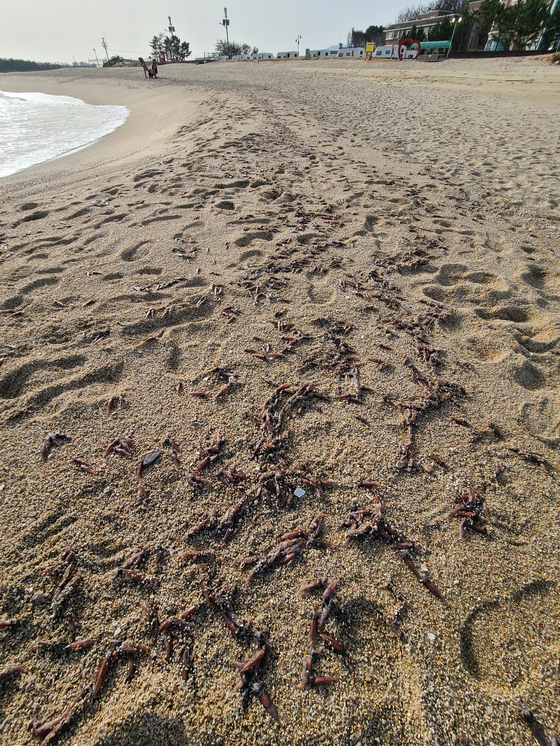
On the 14th, a swarm of squid that was pushed out on a white sandy beach in Goseong-gun, Gangwon-do, is dead. yunhap news
On a beach in Goseong-gun, Gangwon-do, an enormous amount of squid was pushed to the sandy beach and found dead.
7cm small squid that lives in the deep sea
There is also a group death on the beach in Sokcho in 2013
According to Goseong-gun on the 14th, residents discovered that a small school of squid was pushed to the white sand and died on the beach in Bongpo-ri, Toseong-myeon. At that time, squid was scattered about 500m from Bongpo Port to the vicinity of Cheongganjeong. Most of the squids were only 4~5cm in size. “I have lived in Bongpo-ri for more than 40 years, and this is the first time,” said one resident.
On this day, the small squid pushed out of the coast of Goseong was identified as majestic squid. Squid lives in the deep sea at a depth of 200-600m, and it is only 7cm in size even if it becomes an adult. Experts believe that the squid was pushed out of the beach because of the upset phenomenon of seawater. The rise-up phenomenon refers to a phenomenon in which low-rise water rises to the surface to fill in voids created when seawater from the coast is pushed toward the open sea by wind.

On the 14th, a swarm of squid that was pushed out on a white sandy beach in Goseong-gun, Gangwon-do, is dead. yunhap news
An official of the National Institute of Fisheries Science explained, “It is highly likely that the mackerel squid, which lives in a deeper water than the lean squid, died without enduring the sudden change in water temperature and air pressure caused by the uprising phenomenon, and was pushed to the shore.”
This is not the first time that large amounts of squid have been pushed out of the east coast of Gangwon-do. A similar thing happened at Sokcho Beach in December 2013. At that time, there was a scene where residents and tourists flocked to the beach to pick up squid.
At that time, the National Fisheries Research and Development Institute conducted a close examination to find out the cause of the death of a squid found in Sokcho Beach. As a result, radioactive cesium or iodine was not detected in the squid, so the cause of swarm death was not related to radioactive contamination. On the other hand, the cuttlefish is a marine luminescent species with black luminescent cells on its arms, and has a lifespan of about 1 year.
Go Seong = Reporter Park Jin-ho [email protected]
